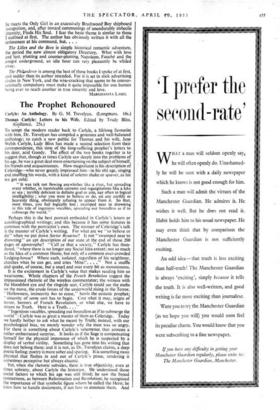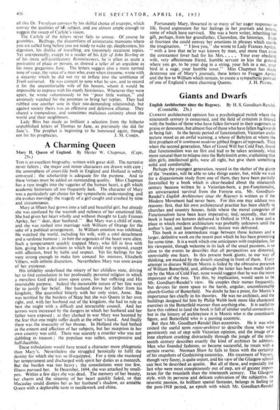The Prophet Rehonoured
Carlyle: An Anthology. By G. M. Trevelyan. (Lonmnans. 16s.) Thomas Carlyle: Letters to his Wife. Edited by Trudy Bliss. (Gollancz. 25s.) To tempt the modem reader back to Carlyle, a lifelong favourite with him, Dr. Trevelyan has compiled a generous and well-balanced anthology; to catch a new public for Thomas and his wife, Jane Welsh Carlyle, Lady Bliss has made a second selection from their correspondence, this time of the long-suffering prophet's letters to his dear, acid Goody. The effect of the two books together is to suggest that, though at times Carlyle saw deeply into the problems of his age, he was a great deal more entertaining on the subject of himself, his friends and acquaintances. How magnificent is his description of Coleridge—who never greatly impressed him—in his old age, singing and snuffling his words, with a kind of solemn shake or quaver, as his tea got cold; " It was talk not flowing anywhither like a river, but spreading every whither, in inextricable currents and regurgitations like a lake or sea ; terribly deficient in definite goal or aim, nay often in logical intelligibility • what you were to believe or do, on any earthly or heavenly thing, obstinately refusing to appear from it. So that, most times, you feel logically lost ; swamped near to drowning in this tide of ingenious vocables, spreading out boundless as if to submerge the world."
Perhaps this is the best portrait embedded in Carlyle's letters or autobiographical writings; and this because it has some features in common with the portraitist's own. The manner of Coleridge's talk is the manner of Carlyle's writing. For what are we "to believe or do" when we put down Sartor Resartus? Is not "swamped near to drowning" an apt description of our state at the end of-those 200 pages of apostrophe? "Call ye that a society," Carlyle has thun- dered, "where there is no longer any Social Idea extant; not so much as the Idea of a common Home, but only of a common over-crowded Lodging-house? Where each, isolated, regardless of his neighbour, clutches what he can get, and cries 'Mine" " Not a snuffle and quake, of course, but a snarl and roar every bit as monotonous.
It is the excitement in Carlyle's voice that makes reading him so wearisome. Whole chapters of the French Revolution suggest the impassioned rhetoric of the wireless commentator; the witness with the bloodshot eye and the ringside seat, Carlyle could see the mobs on the move, the crude forces of the underworld rising in the Terror. "Hollowness, insincerity has to cease," bawls the ecstatic prophet; "sincerity of some sort has to begin. Cost what it may, reigns of terror, horrors of French Revolution, or what else, we have to return to Truth. Here is a Truth. . . ."
"Ingenious vocables, spreading out boundless as if to submerge the world": Carlyle was as great a master of them as Coleridge. Today we hardly bother to ask what he meant by Truth; instead, with our psychological bias, we merely wonder why the man was so angry. For there is something about Carlyle's vehemence that arouses a rather embarrassed surprise. It looks as if the Sage is compensating himself for the physical impotence of which he is suspected by a display of verbal virility. Something has gone into his writing that does not belong there; and it is not, as Dr. Trevelyan claims, a deep poetic feeling; poetry is more sober and sparing. It is something more physical that flashes in and out of Carlyle's prose, rendering it sometimes perceptive but always chaotic.
Yet, when the rhetoric subsides, there is true objectivity, even at times sobriety, about Carlyle the historian. He understood those social factors to which his age was still blind; he sai, the broad connections, as between Reformation and Revolution; he recognised the importance of that symbolic figure whom he called the Hero; he knew how to handle documents, if not how to annotate them. And
all this Dr. Trevelyan conveys by his skilful choice of excerpts, which convey the qualities of his subject, and are almost ample enough to suggest the sweep of Carlyle's vision.
The Carlyle of the letters never fails to amuse. Of course he grumbles. Bedbugs, the discomforts of aristocratic mansions where you are called long before you are ready to wake up, sleeplessness, his digestion, his dislike of travelling, are tiresomely recurrent topics. Yet unexpectedly, except to a reader of his Life of John Sterling or of his more self-justificatory Reminiscences, he is often as acute a portraitist of place or person, as shrewd a teller of an anecdote as his more gregarious Jane. The letters suggest also a more normal tone of voice, the voice of a man who, even when tiresome, wrote with a sincerity which he did not try to inflate into the semblance of Truth universal. He was content to note what he saw, and to record it for the uncomfortable wife of his bosom, whom it would be impossible to impress with his manly histrionics. Whenever they were apart, he wrote voluminously to his "poor little woman," and anxiously watched for the postman to bring her replies. They had rubbed one another sore in their too-demanding relationship, but against society theirs was an offensive and defensive alliance. They shared a tremendous, and sometimes malicious curiosity about the world and their neighbours.
Lady Bliss has made as brilliant a selection from the hitherto unpublished letters of Thomas to Jane, as previously she did for Jane's. The prophet is beginning to be honoured again,. though



































 Previous page
Previous page